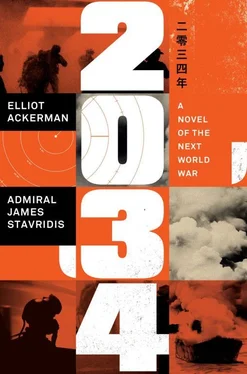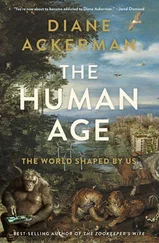Lin Bao entered the combat information center and found Minister Chiang waiting for him via secure video teleconference. “Comrade Minister,” Lin Bao began, “it is good to see you.” When the Zheng He had gone dark, the two had continued to email, but because of security concerns they hadn’t spoken. Upon seeing each other again there was an embarrassed silence, as if each were taking a measure of the other’s strain.
“It is good to see you too,” began Minister Chiang, who then proceeded to laud Lin Bao and his crew on their exceptional conduct, not only in maneuvering the Zheng He Carrier Battle Group into position—a complex task to be sure—but also for repairing their ship while underway, so that it stood poised to achieve a great victory. On and on the minister went. The more congratulations he heaped on the crew of the Zheng He , the more it unsettled Lin Bao.
Something was wrong.
“Late last night, the Legislative Yuan scheduled an emergency session,” said Minister Chiang. “I expect a vote for dissolution in the coming days….” His voice began to peter out, to choke even. “Our plan seems to be coming together….” He pinched the bridge of his nose and squeezed his eyes shut. He took a long, heavy breath, and then, in a more defeated tone, he added, “However, there is a concern. The Americans have threatened a nuclear strike—no doubt you’ve heard.”
Lin Bao hadn’t heard. He shot a glance at one of his intelligence analysts, who sat an arm’s length away. For the last twelve hours they’d been in a communications blackout. The young sailor immediately pulled up the New York Times home page on an unclassified laptop. The headline was in the largest, boldest font: with red line drawn , nuclear weapons an option, says president. The story had been filed several hours earlier.
Lin Bao wasn’t certain how to respond to Minister Chiang. All he could think to do was provide the latest disposition of the Zheng He Carrier Battle Group, so he began talking mechanically. He reviewed the readiness of his flight crews, the placement of his surface escorts, the arrangements of his assigned submarines. On and on he went. But as he covered these technical details, Minister Chiang began to nervously bite his fingernails. He stared at his hands. He hardly seemed to listen.
Then Lin Bao blurted out, “Our plan remains a good one, Comrade Minister.”
Minister Chiang glanced up at him and said nothing.
Lin Bao continued, “If the Legislative Yuan votes to dissolve, the Americans can’t launch a strike against us. They aren’t brazen enough to attack us for a vote taken by someone else.”
Minister Chiang stroked his round chin. “Perhaps,” he said.
“And if they did strike, they can’t attack our fleet. They don’t have precise positional data, even for a tactical nuclear strike. Also, we’re only a few miles off the coast of Taipei—the collateral damage to the ports would prove catastrophic. That is the genius of your plan, Comrade Minister. We subdue the enemy without ever fighting. As Sun Tzu said, it’s ‘ the supreme art of war. ’”
Minister Chiang nodded and repeated, “Perhaps.” His voice was thin, as if he needed a drink of water. Then their video teleconference was over. The Legislative Yuan had a vote to take. The Americans had drawn a red line, one that they might or might not enforce. There was little for Lin Bao and his crew to do, except to wait. It was now early morning. On his way back to his cabin, Lin Bao checked the bridge watch. His crew, despite their youth and inexperience, executed their duties vigilantly. Each understood the enterprise they were embarked upon. In the near distance was the Taiwanese coast, shrouded in a predawn fog. Their fleet was also concealed in this fog. The sun would soon rise and that fog would burn away. The island would reveal itself and so, too, would they. But Lin Bao was tired. He needed to get some rest.
He returned to his quarters and attempted but failed to sleep. Eventually, he tried reading. He scanned his bookshelf and saw his copy of The Art of War , which, ironically, he’d first read at the US Naval War College in Newport. As he browsed the well-annotated pages, he thought of the fog in Newport, the way it clung to the coast, its consistency, how a ship sliced through it, and how it reminded him of the fog here. He then came to a passage, one he’d read many times before but seemed to have forgotten in the intervening years: If you know the enemy and know yourself, you need not fear the result of a hundred battles. If you know yourself but not the enemy, for every victory gained you will also suffer a defeat. If you know neither the enemy nor yourself, you will succumb in every battle.
Lin Bao shut his eyes.
Did he know his enemy? He tried to remember everything he could of America. He thought of his years studying there, living there, and of his mother, that other half of him who was born there. When he shut his eyes, he could hear her voice, how she used to sing to him as a child. Her songs… American songs. He hummed one unevenly to himself, “The Dock of the Bay”; its rhythm, he knew it so well. At last he fell into a deep and peaceful sleep.

21:37 May 21, 2034 (GMT-4)
Washington, D.C.
The morning before it was delivered, a copy of the president’s Oval Office address had been circulated widely and thoroughly staffed. It had traveled through the interagency coordination process—State, Defense, Homeland Security, even Treasury had all weighed in with their comments. The press secretary, senior political advisors, and select members of the national security staff, including Chowdhury, had been privy to the rehearsals, which had taken place with the president sitting behind the Resolute Desk. Chowdhury thought she looked good, very composed, steady.
That evening, when it came time for her to deliver her remarks, Chowdhury was sitting at his desk while his colleagues gathered around one or another of the ubiquitous televisions that littered the cramped West Wing. Chowdhury wasn’t watching; after the many rehearsals he hadn’t felt the need to. It was only when he heard a collective murmur that he glanced up. Neither he nor any of his colleagues had known that the president planned to announce the authorization of a potential nuclear strike. Before they had a chance to do anything except to stare dumbfounded at the television, the door to the Oval Office swung open. A handful of cabinet officials strode past. Based on their demeanor—the blank looks, the tight whispers—they were caught off guard too. The only two who appeared unfazed were Hendrickson and Wisecarver. Wisecarver beckoned Chowdhury into his office, which in the previous week had been moved kitty-corner to the president’s own.
“C’mon in,” said Wisecarver, as he waved Chowdhury through the door. “We can get this done with a five-minute stand-up.” Wisecarver’s office was a chaos of neglect. A framed gradeschool portrait of the son he’d lost sat next to his keyboard, but this was the only personal object amid the binders and folders that piled his desk and every shelf, one open on top of another. Each cover sheet contained an alphabet soup of classification codes. He began to stack documents one by one in either Chowdhury’s or Hendrickson’s outstretched hands, depending on whether the action needed to originate from the executive branch or Department of Defense. Wisecarver, a master in the language of bureaucracy, talked his subordinates through their paper chase with a practiced enthusiasm. Each minor task Wisecarver assigned to Hendrickson and Chowdhury took the country one step closer to a nuclear war.
Читать дальше













